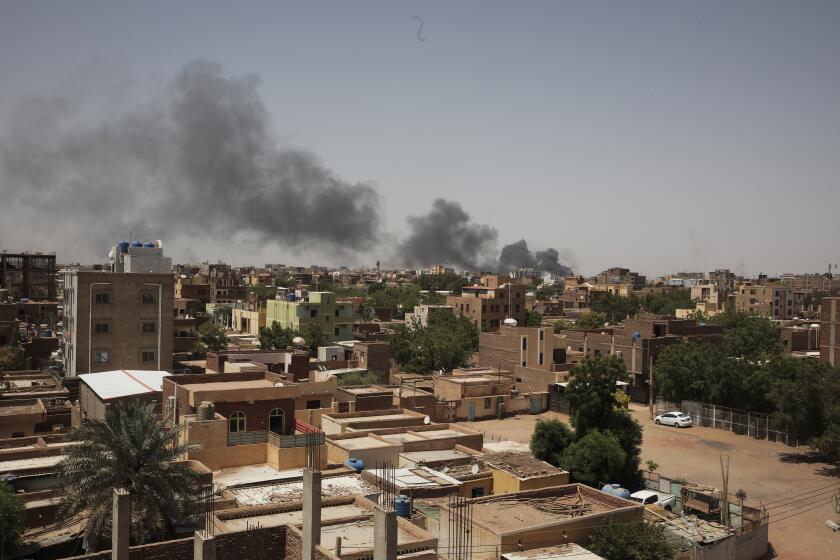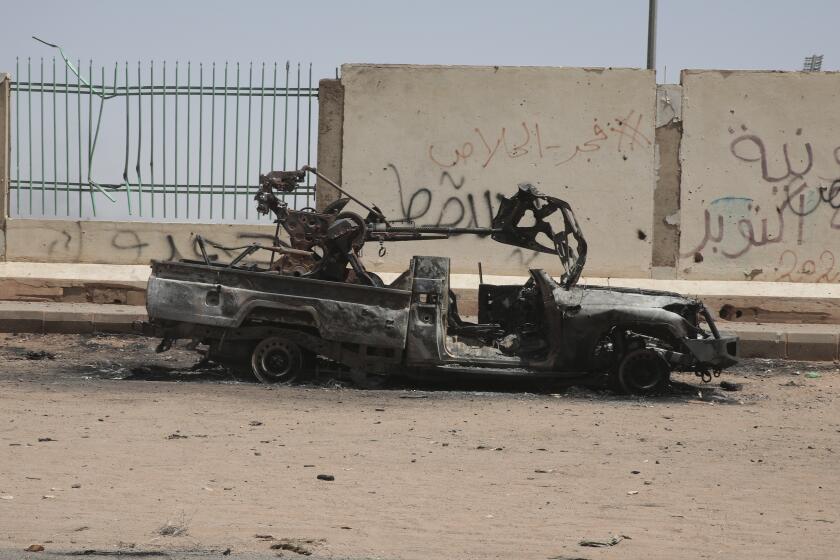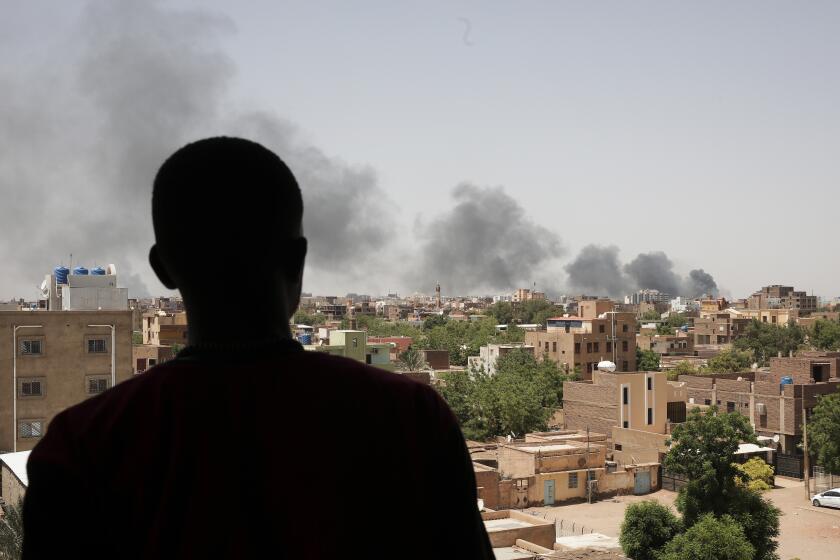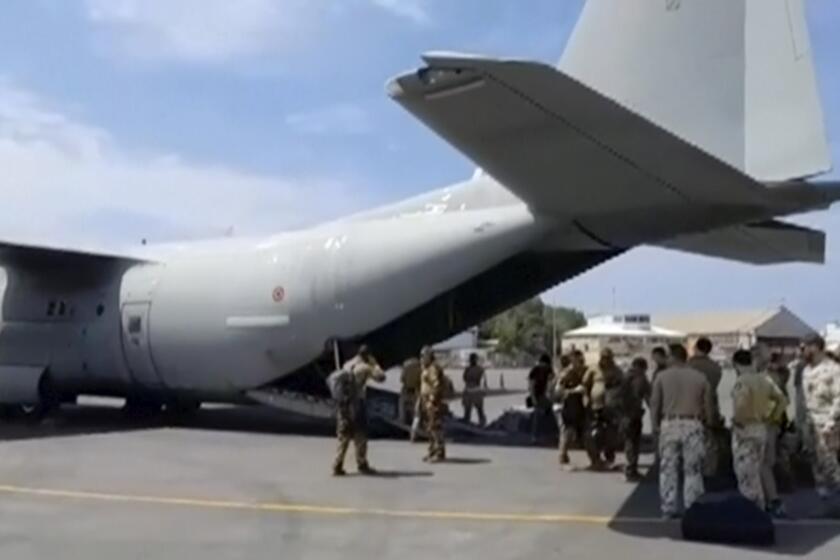Sudan conflict poses high stakes for global trade and U.S. credibility
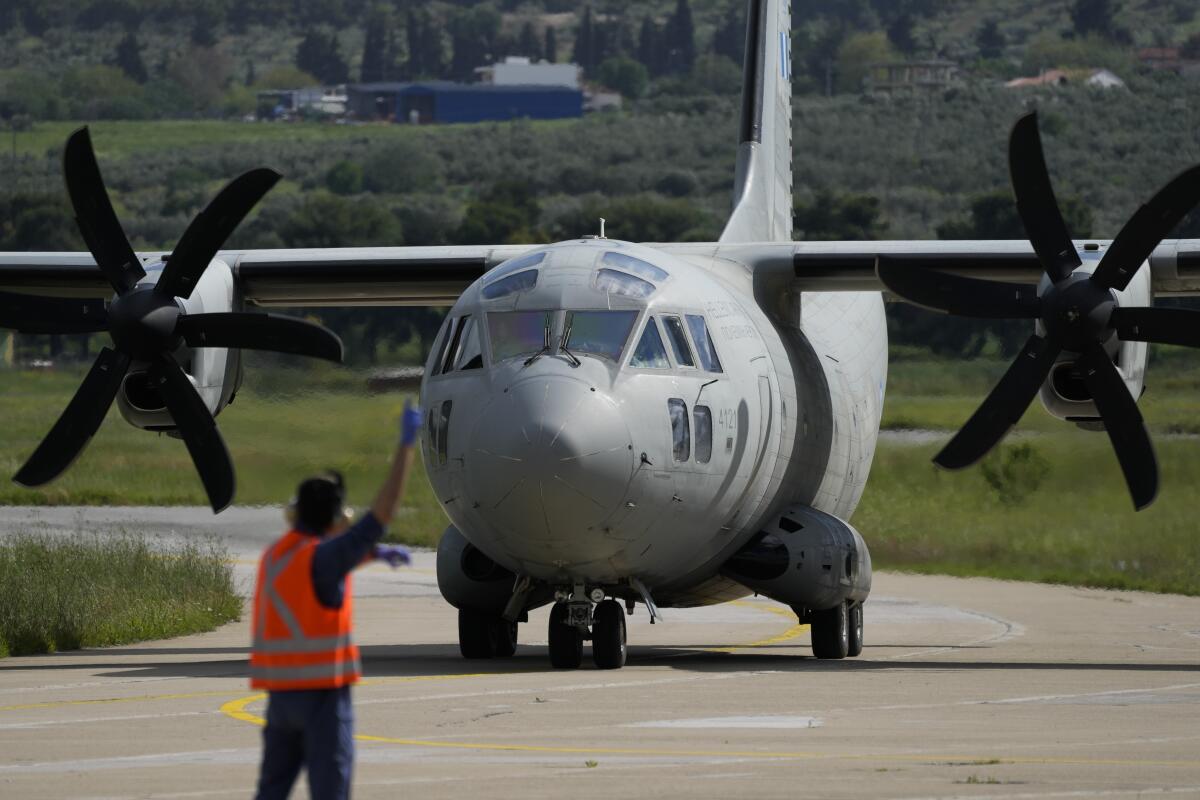
- Share via
WASHINGTON — After 10 days of brutal urban warfare that has killed hundreds, a tenuous cease-fire is in place in Sudan, brokered by the United States with assistance from Saudi Arabia.
U.S. Secretary of State Antony J. Blinken and a high-level team spent hours on the telephone over the last week, speaking directly to the two Sudanese generals leading opposing sides of the conflict, as well as other key actors from half a dozen nations.
The United States has long taken a major role behind developments in Sudan, in ending the dictatorship of Omar Hassan Ahmed Bashir and in attempting to usher the country into democracy — an effort that has failed perilously so far.
“The Sudanese people are not giving up, and neither will we,” said U.S. Assistant Secretary of State for African Affairs Molly Phee, as she announced over the weekend the indefinite closing of the nation’s embassy in Khartoum after American special forces airlifted nearly 100 U.S. diplomats from the Sudanese capital in a high-security mission in the dead of night.
Foreign governments evacuate diplomats, staff and others from Sudan as rival generals battle for a ninth day despite a declared truce for
She noted continuing efforts to suspend fighting amid profound distrust between the warring parties. There is no guarantee the cease-fire will hold, and many observers believe Sudan is on the brink of all-out civil war.
“Despite these challenges,” Phee said, “the stakes are too high for Sudan and for the region to stop trying.”
Sudan may not be on the top of the agenda for many Americans, but the stakes in the northeastern African country are, indeed, high for the U.S., as well as Sudan and the entire region, diplomats and analysts say.
From its strategically critical geographic location to its long, hard quest for freedom from military rule, Sudan has proved an appealing partner for the U.S. and a potential model for political transition in Africa.
A country of 46 million people, Sudan straddles the Nile River and sits on the Red Sea, which serves as the artery for more than $700 billion in ocean-transiting global trade.
Since it also borders six countries, Sudan is a bridge between northern Africa — the primarily Arabic countries of Egypt and Libya — and the Sahel, a strip stretching from the Atlantic Ocean in the west to the Red Sea, skirting numerous countries and laying a hotbed for jihadi terrorist groups. And to the south is Ethiopia.
This makes Sudan a linchpin in regional peace, commerce and political development. Aside from the devastating human toll, Sudan’s instability poses major threats to the economy.
“The way Sudan falls will fundamentally shape whether the region is stable or violent,” said Susan Stigant, head of the Africa programs at the U.S. Institute of Peace. A Sudan in chaos would probably disrupt maritime security and could give Islamic extremist groups such as the Somali-based Shabab a new foothold in the region.
Neighboring Chad, a strong U.S. ally, would also be vulnerable to spillover violence from Sudan.
Fighting in Sudan between forces loyal to two top generals has put that nation at risk of collapse and could have consequences far beyond its borders.
The U.S. has invested political capital in Sudan’s fate for decades. U.S. officials pushed for the prosecution of accused war criminals responsible for the genocide in western Sudan’s Darfur region in the early 2000s, in which hundreds of thousands of people were killed.
In response, Washington levied heavy economic sanctions on Bashir-ruled Sudan and placed the country on an especially ignominious State Department shortlist: state sponsors of terrorism. In 2019, the people of Sudan rose up in a massive nonviolent protest, risking harsh crackdowns while demanding freedom, justice and an end to three decades of dictatorship under Bashir.
The longtime president was deposed. Democratic change seemed to be in the offing, with a new transitional government seated and the enthusiastic backing of the United States, Europe and other countries.
“As an American value, it is so rare to have a demand so clear, so organized, that the U.S. can get behind,” Stigant said.
Biden says that the U.S. military had completed the evacuation of U.S. Embassy personnel in Sudan, and called for end to “unconscionable” violence
But two years later, Sudan’s top two military commanders — to hold on to power and to avoid being held accountable for Darfur atrocities — staged a coup. Now, those two men are squaring off against each other, both with outsized ambitions to lead the country. Gen. Abdel-Fattah Burhan heads the Sudanese armed forces, and his former No. 2 and now archrival, Gen. Mohamed Hamdan Dagalo, known as Hemedti, marshals the Rapid Support Forces, or RSF. Despite some calls from Washington and elsewhere for outsiders to stay out, Egypt is said to back Burhan, while the United Arab Emirates stands with Hemedti and the RSF.
The generals and other members of the elite are said to have gotten wealthy off Sudan’s abundance of gold and other valuable mineral resources, while the wealth never filtered down to ordinary people. The resources often inoculated leaders against the U.S. sanctions, which in turn prevented American investment in Sudanese mines and infrastructure.
Another risk for U.S. interests in Sudan comes from Russia. For several years, the infamous Wagner Group, a Kremlin-backed private military company, has been active in Sudan, initially supporting Bashir in December 2017 while securing gold exports for a Russian company.
Jeffrey Feltman, the former U.S. special envoy for the Horn of Africa, said “very nefarious” Russian activity continued to be documented during the fledgling democratic transition. The Russians, Feltman said in an extensive report last year, were “trying to basically disrupt a civilian transition.”
Sudan’s warring generals pledge to observe a new three-day truce that was brokered by the U.S. and Saudi Arabia to try to quell the deadly fighting.
Not surprisingly, Wagner — which gained infamy this last year in its ruthless front-line battles in Russia’s war against Ukraine but has been operating in more than two dozen other countries — backed the 2021 military coup and is now jockeying for continued advantage. Russia has also long coveted a port on the Red Sea.
The Wagner Group has sufficient military assets and a masterful disinformation apparatus to be able to continue to meddle in the conflict in Sudan while maintaining deniability, analysts said.
This poses another challenge to U.S. interests.
“When we see them [the Wagner Group] engage in any country, we find that country ends up being more vulnerable, more prone to destabilization, more prone to threats,” State Department spokesman Vedant Patel said Tuesday. “And so, we are working collectively with our allies and partners to curb the influence of the Wagner Group, of course on the African continent but elsewhere as well.”
Washington has lost a lot of diplomatic, political and economic ground to Russia — and even more to China — in places such as Africa and Latin America in the last decade. The Biden administration is attempting to make the case in Sudan and elsewhere that the U.S. should be the preferred partner. But the chaos in Sudan will make that argument all the more murky.
More to Read
Sign up for Essential California
The most important California stories and recommendations in your inbox every morning.
You may occasionally receive promotional content from the Los Angeles Times.
